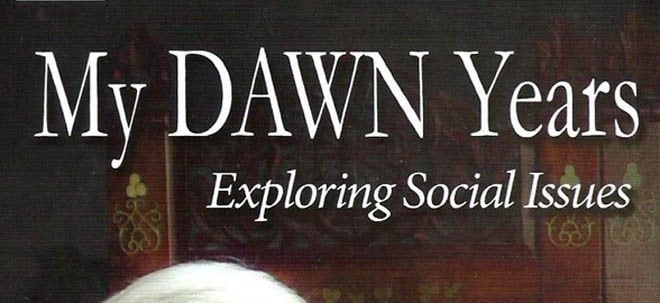
Zubeida Mustafa’s book is not just for the practitioner and lover of journalism, it’s been written by someone who has worked on raising awareness about social issues

"I also discovered during this phase what the newspaper reader’s habit means. I had been told that it was one of the most difficult habits to break -- even more than cigarette smoking," writes Zubeida Mustafa in her almost-autobiographical book My Dawn Years -- Exploring Social Issues. With her work as an editor and a journalist spanning more than three decades, and her columns continuing to appear to date, Mustafa, then, is also a hard-to-break habit for the Pakistani newspaper reader.
Hers is one of those names that have left a mark. This book, released earlier this year, is therefore an important one -- for her peers, for journalists like me who continue to have fan-girl moments as we read about the work of this woman who blazed the trail for female journalists in Pakistan, and for aspiring journalists and students of media sciences.
Yet, this book is not just for the practitioner and lover of journalism. Un-heavy, readable, and relatable, this book, Mustafa’s fourth, is from the pen of someone with a heart who has worked on raising awareness about social issues pertaining to human rights, education, health, diversity, rights of the marginalised and empowerment.
The book is not about her personal life per se, but is, in fact, about the biggest part of this person’s life -- her professional odyssey. And what a ride it has been. From the time of handwritten articles being submitted to the editor to the time of digitalised newspapers and converged newsrooms, Mustafa has witnessed the change. She has also witnessed how changes in society have affected people, narratives, collective social trends, ideologies, and in turn the media. "Technology has, however, also had a very damaging effect on the media," she rightly points out in the book. "By adding speed to news gathering and news dissemination technology has taken away that ‘pause time’ that was used to ponder issues…" she writes.
Sharing the feedback she has received for this book, the ever down-to-earth Mustafa talks about why this is an important book for up-and- coming journalists. "Most young professionals could relate to what I wrote because their dilemmas and challenges continue to exist, but they are not necessarily identical to what I faced. What was satisfying was that many of them said they were inspired and they learnt that they can cope with their problems in a positive way," she says, mentioning how someone especially wrote about her views on the importance of integrity and truth.
"I want this message of positivity and integrity to get across to the readers." One of the best ways for this message and the invaluable experience of a veteran like Mustafa would be to make this book a part of compulsory reading, or better still the curriculum, for students of journalism, because learning the value of integrity and honesty is something our media needs desperately.
In her years with Dawn, Mustafa launched and edited Dawn’s pages on health, education, "Karachi Notebook", and Pakistan’s first book magazine that was part of a newspaper, Books & Authors, among others. She touches upon the experiences she gained while crafting these pages.
Yet, the person can never be far removed from the professional if the profession is pursued with passion, especially if one is a woman. The last two chapters will resonate with readers, as they are candid and touching. In the second-last chapter titled "The personal becomes professional", she gets straight to the point in the first sentence: "Those who believe that a woman can keep her personal and professional lives apart and not let one impinge on the other are grossly mistaken".
She lets in the reader by sharing some of the toughest choices she had to make -- as a mother, a journalist, and as a woman. But her work remained her mainstay. Which is why Mustafa has not really ‘retired’, and continues to contribute. The last chapter, poetic and nostalgic yet motivating, has these words: "Do journalists ever retire? Or do they just fade away like the old soldiers cited in the ballad that did the rounds in the military barracks of Britain and America during the two world wars. Even today when I am not attached to any newspaper I never feel I am not a journalist".
Her memoirs, encapsulated in this engaging book of 200-plus pages, do not just have information, but also make one think. This is perhaps the best job description of a journalist -- to relay information truthfully, and to make the reader think. Zubeida Mustafa is still very much a journalist, then.
My Dawn Years -- Exploring Social Issues
Author: Zubeida Mustafa
Publisher: Paramount Books
Year: 2018
Pages: 240
Price: Rs660